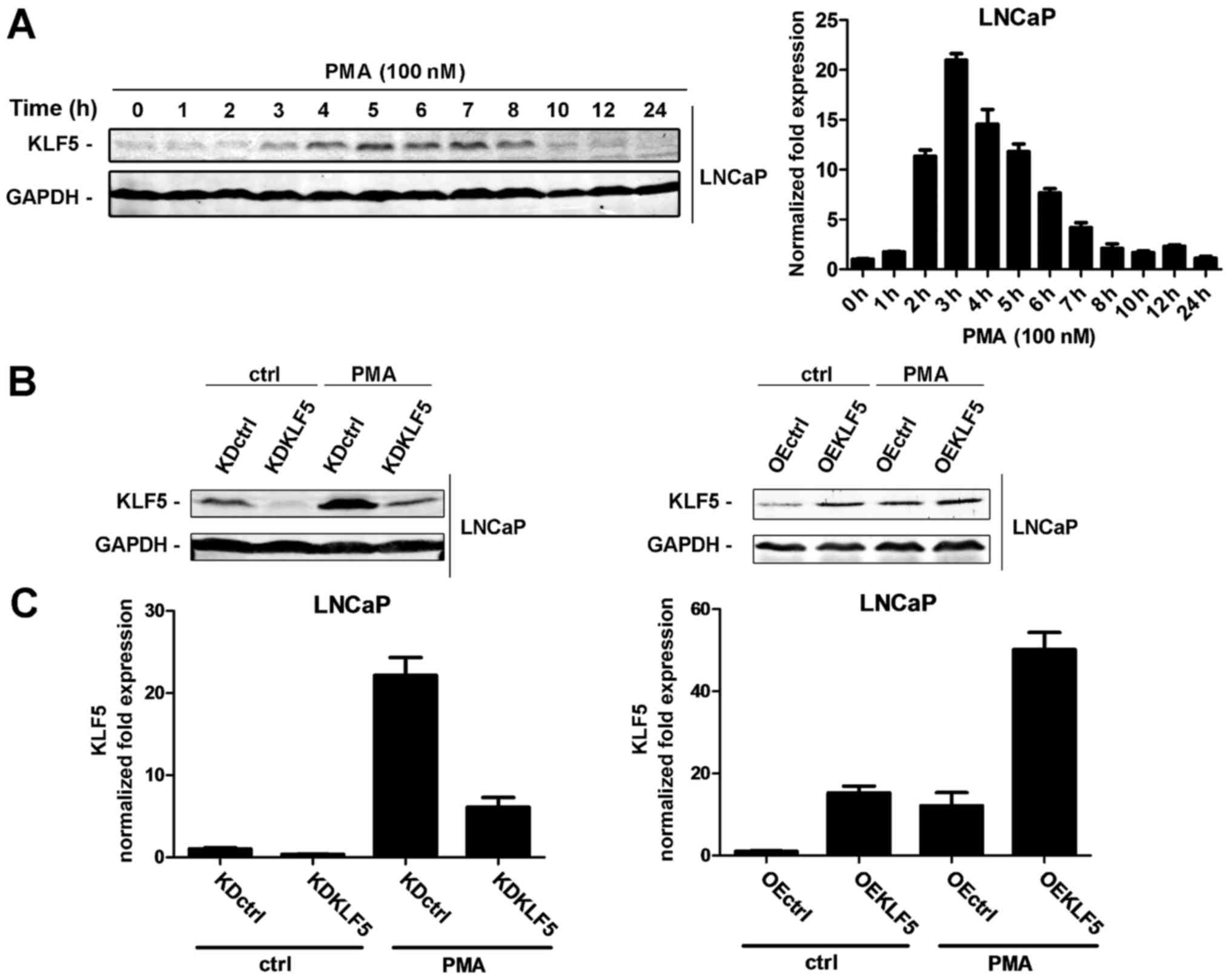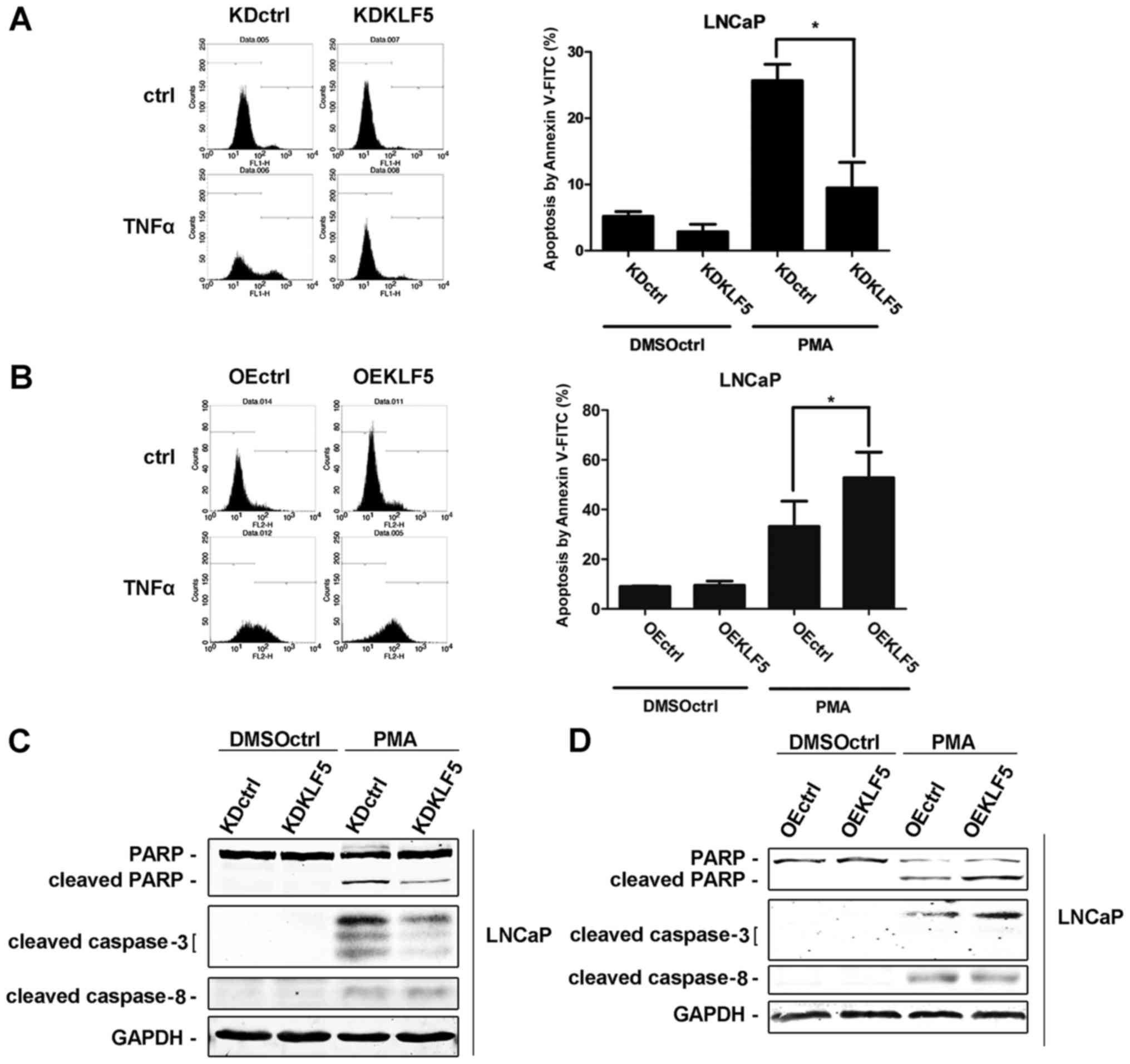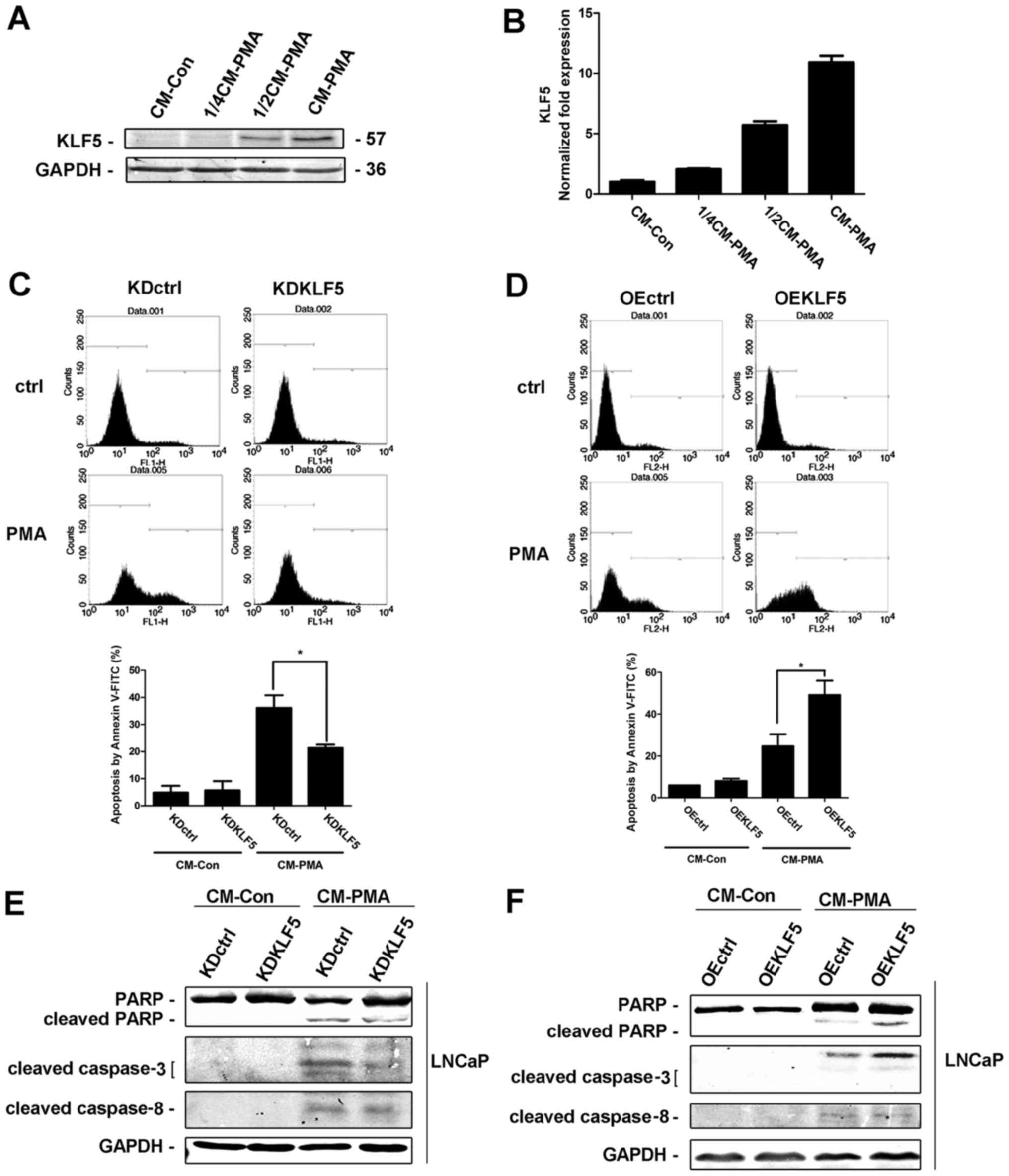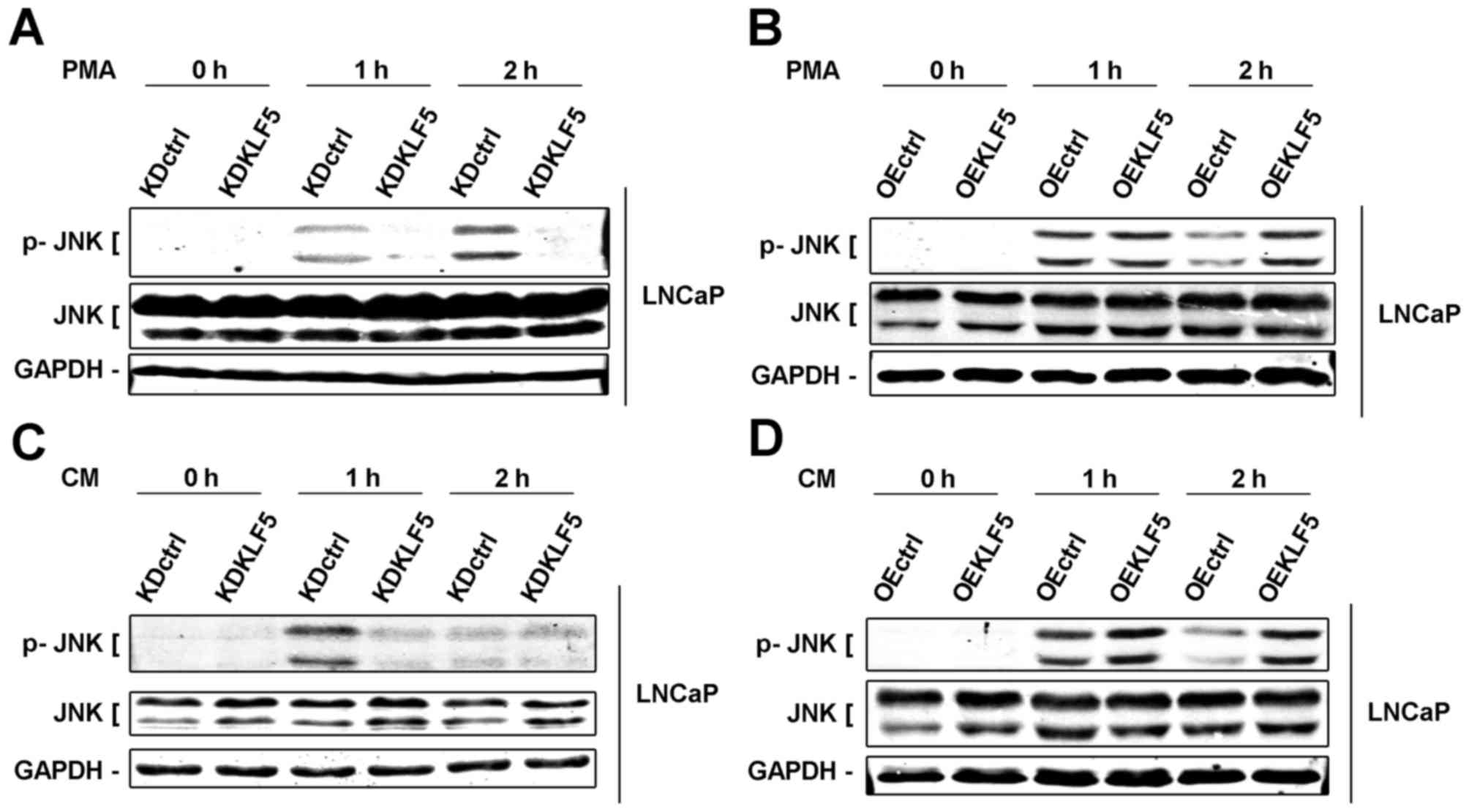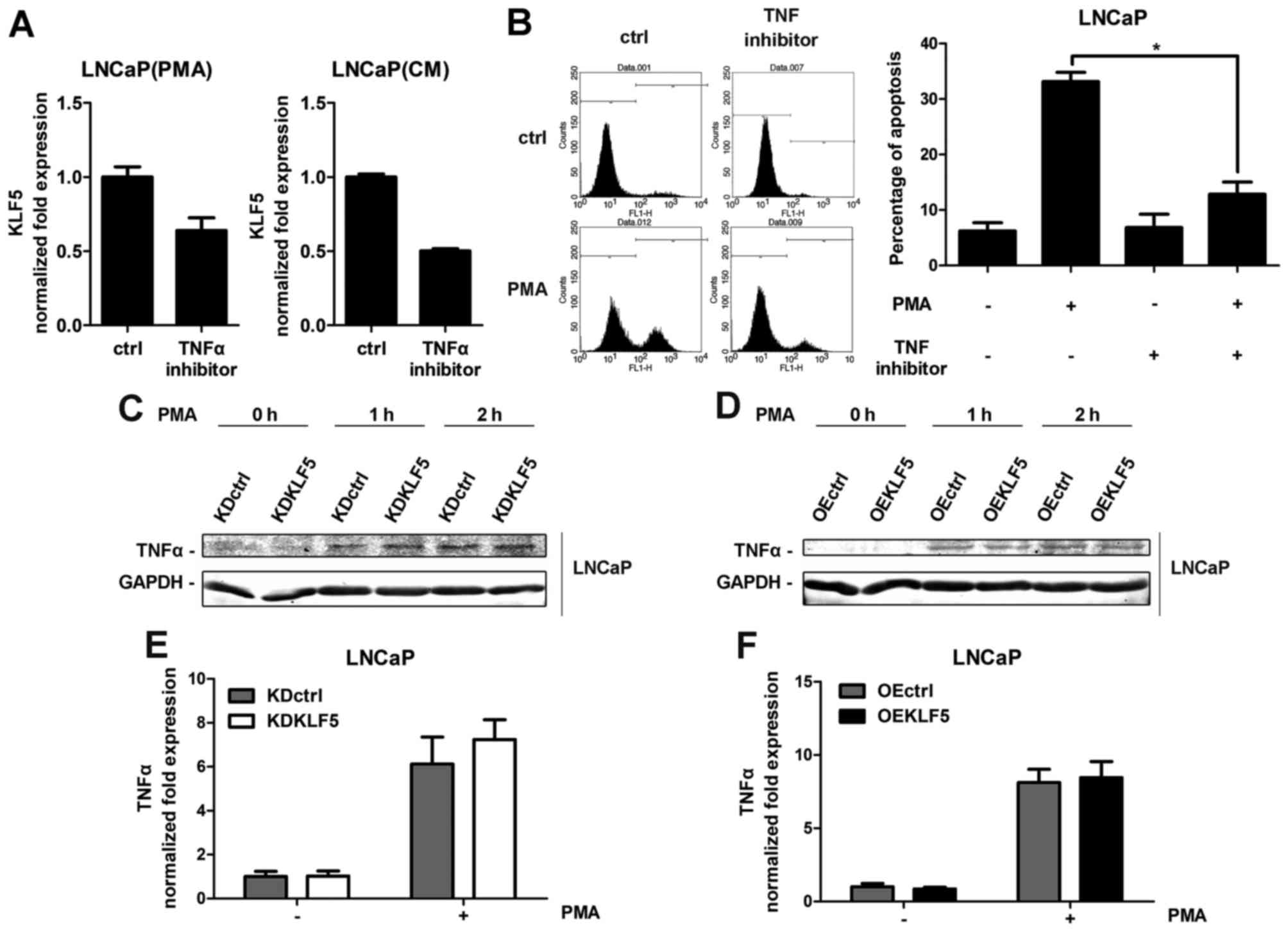|
1
|
Siegel RL, Miller KD and Jemal A: Cancer
statistics, 2015. CA Cancer J Clin. 65:5–29. 2015. View Article : Google Scholar : PubMed/NCBI
|
|
2
|
Mukherji D, Omlin A, Pezaro C, Shamseddine
A and de Bono J: Metastatic castration-resistant prostate cancer
(CRPC): Preclinical and clinical evidence for the sequential use of
novel therapeutics. Cancer Metastasis Rev. 33:555–566.
2014.PubMed/NCBI
|
|
3
|
Barry OP and Kazanietz MG: Protein kinase
C isozymes, novel phorbol ester receptors and cancer chemotherapy.
Curr Pharm Des. 7:1725–1744. 2001. View Article : Google Scholar : PubMed/NCBI
|
|
4
|
Garcia-Bermejo ML, Leskow FC, Fujii T,
Wang Q, Blumberg PM, Ohba M, Kuroki T, Han KC, Lee J, Marquez VE
and Kazanietz MG: Diacylglycerol (DAG)-lactones, a new class of
protein kinase C (PKC) agonists, induce apoptosis in LNCaP prostate
cancer cells by selective activation of PKCalpha. J Biol Chem.
277:645–655. 2002. View Article : Google Scholar : PubMed/NCBI
|
|
5
|
Tanaka Y, Gavrielides MV, Mitsuuchi Y,
Fujii T and Kazanietz MG: Protein kinase C promotes apoptosis in
LNCaP prostate cancer cells through activation of p38 MAPK and
inhibition of the Akt survival pathway. J Biol Chem.
278:33753–33762. 2003. View Article : Google Scholar : PubMed/NCBI
|
|
6
|
Xiao L, Eto M and Kazanietz MG: ROCK
mediates phorbol ester-induced apoptosis in prostate cancer cells
via p21Cip1 up-regulation and JNK. J Biol Chem. 284:29365–29375.
2009. View Article : Google Scholar : PubMed/NCBI
|
|
7
|
Gonzalez-Guerrico AM and Kazanietz MG:
Phorbol ester-induced apoptosis in prostate cancer cells via
autocrine activation of the extrinsic apoptotic cascade: A key role
for protein kinase C delta. J Biol Chem. 280:38982–38991. 2005.
View Article : Google Scholar : PubMed/NCBI
|
|
8
|
Xiao L, Gonzalez-Guerrico A and Kazanietz
MG: PKC-mediated secretion of death factors in LNCaP prostate
cancer cells is regulated by androgens. Mol Carcinog. 48:187–195.
2009. View
Article : Google Scholar : PubMed/NCBI
|
|
9
|
Guo P, Dong XY, Zhang X, Zhao KW, Sun X,
Li Q and Dong JT: Pro-proliferative factor KLF5 becomes
anti-proliferative in epithelial homeostasis upon
signaling-mediated modification. J Biol Chem. 284:6071–6078. 2009.
View Article : Google Scholar : PubMed/NCBI
|
|
10
|
Gao Y, Wu K, Chen Y, Zhou J, Du C, Shi Q,
Xu S, Jia J, Tang X, Li F, et al: Beyond proliferation: KLF5
promotes angiogenesis of bladder cancer through directly regulating
VEGFA transcription. Oncotarget. 6:43791–43805. 2015.PubMed/NCBI
|
|
11
|
Gao Y, Shi Q, Xu S, Du C, Liang L, Wu K,
Wang K, Wang X, Chang LS, He D and Guo P: Curcumin promotes KLF5
proteasome degradation through downregulating YAP/TAZ in bladder
cancer cells. Int J Mol Sci. 15:15173–15187. 2014. View Article : Google Scholar : PubMed/NCBI
|
|
12
|
Tong D, Czerwenka K, Heinze G, Ryffel M,
Schuster E, Witt A, Leodolter S and Zeillinger R: Expression of
KLF5 is a prognostic factor for disease-free survival and overall
survival in patients with breast cancer. Clin Cancer Res.
12:2442–2448. 2006. View Article : Google Scholar : PubMed/NCBI
|
|
13
|
Tarapore RS, Yang Y and Katz JP: Restoring
KLF5 in esophageal squamous cell cancer cells activates the JNK
pathway leading to apoptosis and reduced cell survival. Neoplasia.
15:472–480. 2013. View Article : Google Scholar : PubMed/NCBI
|
|
14
|
Chen C, Bhalala HV, Vessella RL and Dong
JT: KLF5 is frequently deleted and down-regulated but rarely
mutated in prostate cancer. Prostate. 55:81–88. 2003. View Article : Google Scholar : PubMed/NCBI
|
|
15
|
Chen C, Sun X, Ran Q, Wilkinson KD, Murphy
TJ, Simons JW and Dong JT: Ubiquitin-proteasome degradation of KLF5
transcription factor in cancer and untransformed epithelial cells.
Oncogene. 24:3319–3327. 2005. View Article : Google Scholar : PubMed/NCBI
|
|
16
|
Aggarwal BB: Signalling pathways of the
TNF superfamily: A double-edged sword. Nat Rev Immunol. 3:745–756.
2003. View
Article : Google Scholar : PubMed/NCBI
|
|
17
|
Chopra DP, Menard RE, Januszewski J and
Mattingly RR: TNF-alpha-mediated apoptosis in normal human prostate
epithelial cells and tumor cell lines. Cancer Lett. 203:145–154.
2004. View Article : Google Scholar : PubMed/NCBI
|
|
18
|
Shi Q, Gao Y, Xu S, Du C, Li F, Tang XS,
Jia J, Wang X, Chang L, He D and Guo P: Kruppel-like factor 5
promotes apoptosis triggered by tumor necrosis factor α in LNCaP
prostate cancer cells via up-regulation of mitogen-activated
protein kinase kinase 7. Urol Oncol. 34:58.e11–e18. 2016.
View Article : Google Scholar
|
|
19
|
Bafford R, Sui XX, Wang G and Conte M:
Angiotensin II and tumor necrosis factor-alpha upregulate survivin
and Kruppel-like factor 5 in smooth muscle cells: Potential
relevance to vein graft hyperplasia. Surgery. 140:289–296. 2006.
View Article : Google Scholar : PubMed/NCBI
|
|
20
|
Chen C, Bhalala HV, Qiao H and Dong JT: A
possible tumor suppressor role of the KLF5 transcription factor in
human breast cancer. Oncogene. 21:6567–6572. 2002. View Article : Google Scholar : PubMed/NCBI
|
|
21
|
Livak KJ and Schmittgen TD: Analysis of
relative gene expression data using real-time quantitative PCR and
the 2(−Delta Delta C(T)) Method. Methods. 25:402–408. 2001.
View Article : Google Scholar : PubMed/NCBI
|
|
22
|
Lorenzo PI and Saatcioglu F: Inhibition of
apoptosis in prostate cancer cells by androgens is mediated through
downregulation of c-Jun N-terminal kinase activation. Neoplasia.
10:418–428. 2008. View Article : Google Scholar : PubMed/NCBI
|
|
23
|
Gavrielides MV, Gonzalez-Guerrico AM,
Riobo NA and Kazanietz MG: Androgens regulate protein kinase Cdelta
transcription and modulate its apoptotic function in prostate
cancer cells. Cancer Res. 66:11792–11801. 2006. View Article : Google Scholar : PubMed/NCBI
|
|
24
|
Xing C, Ci X, Sun X, Fu X, Zhang Z, Dong
EN, Hao ZZ and Dong JT: Klf5 deletion promotes Pten
deletion-initiated luminal-type mouse prostate tumors through
multiple oncogenic signaling pathways. Neoplasia. 16:883–899. 2014.
View Article : Google Scholar : PubMed/NCBI
|
|
25
|
Engedal N, Korkmaz CG and Saatcioglu F:
C-Jun N-terminal kinase is required for phorbol ester- and
thapsigargin-induced apoptosis in the androgen responsive prostate
cancer cell line LNCaP. Oncogene. 21:1017–1027. 2002. View Article : Google Scholar : PubMed/NCBI
|
|
26
|
Ikezoe T, Yang Y, Taguchi H and Koeffler
HP: JNK interacting protein 1 (JIP-1) protects LNCaP prostate
cancer cells from growth arrest and apoptosis mediated by
12–0-tetradecanoylphorbol-13-acetate (TPA). Br J Cancer.
90:2017–2024. 2004. View Article : Google Scholar : PubMed/NCBI
|















